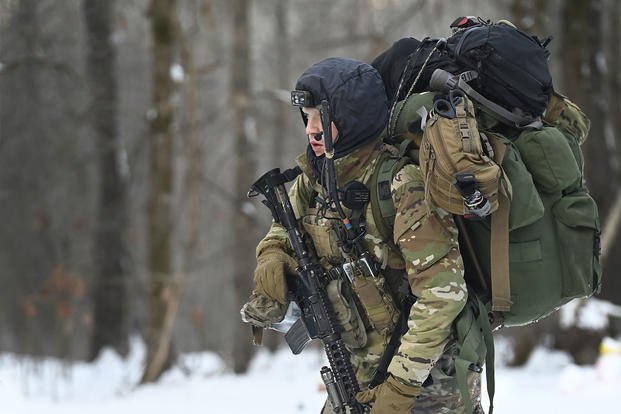The Army's Special Forces (SF) make up a unique, unconventional, combat arms organization. Highly trained and seasoned professionals, they are the most versatile Special Operations (SO) soldiers in the world.
Special Forces, also referred to as the legendary Green Berets, is an elite, multipurpose force for high-priority operational targets of strategic importance. Their lineage dates back to more than 200 years of unconventional warfare history, with notable predecessors that include the Revolutionary War Swamp Fox Francis Marion; the World War II Office of Strategic Services Jedburg Teams and Detachment 101 in Burma; and the Alamo Scouts.
Since their establishment in 1952, Special Forces soldiers have distinguished themselves in Vietnam (17 Medals of Honor), El Salvador, Panama, Desert Shield/Storm, Haiti, Somalia, Bosnia and Kosovo. Most recently, SF has played a critical role in Destroying Taliban/al-Qaida in Afghanistan, rooting out insurgents in Iraq, training foreign troops to fight terrorists or drug warlords, and crossing the globe to liberate the oppressed.
Learn More About Army Special Forces
Their missions often require rapid and discrete responses to unique situations throughout the world. As the Global Scouts for the U.S. military, the Special Forces' ubiquitous presence generally guarantees that SF is the first on the ground or already at a crisis location as trouble emerges. For this reason, they are experts in unilateral direct-action operations and unconventional warfare, as well as having thorough knowledge of foreign languages, customs and cultures.
In addition, they are masters of training and organizing insurgents, surrogate fighters, indigenous forces and foreign militaries in support of U.S. national objectives.
Sense of brotherhood
SF team members work closely together and rely on each other for long periods of time, both during deployments and in garrison. Because of this, they develop close relationships and personal ties that foster a team cohesion and esprit de corps rarely found elsewhere in the military.
Rewards
While the personal satisfaction of a job well-done and the respect of your peers are rewards in themselves, Special Forces soldiers receive many additional financial benefits for their enhanced capabilities, special skills and advanced training, along with the associated hazards that they face.
However, financial rewards are not the primary motivators in SF. More important to most SF soldiers are the intangible rewards, such as job satisfaction, training opportunities, professionalism, responsibility, camaraderie and the feeling of belonging. For many, being considered the best at what you do, relied upon for the toughest missions and succeeding at what others dare not try is reward enough.
Find Available Special Operations Opportunities
More Army Special Forces articles:
- Army Green Beret Training
- Army Ranger PFT
- Preparing for Army Ranger School
- Weight Gain for Ranger School
- Army Airborne PFT
- All Army Special Forces Articles
Want to Learn More About Military Life?
Whether you're thinking of joining the military, looking for fitness and basic training tips, or keeping up with military life and benefits, Military.com has you covered. Subscribe to Military.com to have military news, updates and resources delivered directly to your inbox.

















